
A recent joint statement by three Members of the European Parliament (MEPs) on the construction of a new, third highway between Armenia and Artsakh was not well-received in Armenian circles. The one-page document, written by MEPs Marina Kaljurand (Estonia), Traian Băsescu (Romania) and Zeljana Zovko (Croatia), criticized the construction of the new highway between Kapan and Hadrut, south of the two existing road links.
Contrary to how some may have perceived it, it is important to clarify that the joint statement by the three MEPs does not represent official EU policy. EU law derives from primary sources (treaties), secondary sources (EU legislation, regulations, directives, decisions, recommendations and opinions) and tertiary sources (case law from the ECJ, general principles of EU law, international treaties).
Statements by MEPs do not fall into those categories. They are not reviewed by any European Parliament subcommittee; they are issued on the individual initiative of the co-authors. That is, they are on the political, as opposed to legal, side of the equation and are intended to raise awareness about the topic at hand, serving as a trigger for further media exposure.
The fact that a statement was released at all is a new development in the sense that similar statements had not been released for the two prior highways. The European Parliament (EP) tends not to insert itself into the Nagorno-Karabakh conflict directly, preferring instead to maintain a balance in relations with both Armenia and Azerbaijan and relying on the OSCE Minsk Group as the main format for peace negotiations.
The OSCE Minsk Group has set three principles of the Helsinki Final Act as the starting point of negotiations. They are:
1. Refraining from the threat or use of force
2. Equal rights and self-determination of peoples
3. Territorial integrity of States
The wording of the statement by the three MEPs prioritizes the principle of territorial integrity, which favors Azerbaijan in the negotiations, over the principle of self-determination, which favors Artsakh’s ethnically-Armenian population. For its part, on the occasion of the Video Teleconference of the Leaders of the Eastern Partnership held on June 18, 2020, the Euronest Parliamentary Assembly Bureau’s statement did reassert the status quo balance by mentioning both the principles of self-determination and territorial integrity.
Azerbaijani Member of Parliament Tural Ganjaliev boasted that the statement was a direct result of “very useful meetings” held with the three authors. One of the authors has a long history of championing Azerbaijan’s interests on the European stage. Traian Băsescu served as the President of Romania from 2004 to 2014. He is currently an MEP with the centre-right European People’s Party (EPP) political group and is an active member of several committees including the Delegation to the EU-Ukraine Parliamentary Association Committee, the Committee on Foreign Affairs (AFET), the Delegation to the Euronest Parliamentary Assembly (DEPA)[1] and the Subcommittee on Security and Defence (SEDE).
Băsescu was highlighted in a 2017 report by the Freedom Files Analytical Centre entitled “European values bought and sold,” which is an exploration into Azerbaijan's sophisticated system of projecting its international influence, buying western politicians and capturing intergovernmental organizations. He maintains close ties with Azerbaijani President Ilham Aliyev. In 2011, Băsescu bestowed the highest rank (Grand Cross) of Romania’s National Order of Faithful Service upon Aliyev. Romania maintains interest in forming a transportation corridor for Azerbaijani oil and gas supplies into Europe, through Georgia and across the Black Sea. It was during Băsescu’s tenure as President that the Heydar Aliyev Foundation established its presence in Bucharest and was later linked to organized crime and money laundering.
According to the report, “MEPs and MPs from Romania, especially those connected to the EPP and the Alliance of Liberals and Democrats (ALDE), often act in Azerbaijani interests and, according to our sources, receive direct instructions from Bucharest in order to ensure good Romania-Azerbaijan relations.” The report continues, “Traian Băsescu, starting his presidency as a liberal democrat, later, after a conflict in his party, created his own People's Party, now an EPP member. This became a valuable asset for Azerbaijan's ruling party lobbying efforts to become a member of the EPP. In Bucharest, President Băsescu personally opened a memorial park for Heydar Aliyev. Traian Băsescu's daughter Elena Băsescu continued the work of her father, actively engaging with Azerbaijan while she was an MEP until 2014.”
The other two co-authors of the joint statement do not have as deep a relationship with Azerbaijan, according to the public record. Zeljana Zovko is a Croatian diplomat and politician from a Bosnian-Herzegovinian background. Since 2016, she has served in the European Parliament representing Croatia as a member of the EPP. Zovko was a resident ambassador of Bosnia and Herzegovina to France from 2004 to 2008 and then to Spain between 2008 and 2011. She is neither a member of the Delegation Committee nor DEPA. She is a member of AFET and the Delegation for relations with Bosnia and Herzegovina, and Kosovo (DSEE). While all conflicts are unique, the Western Balkans are a case where the principle of self-determination led to the creation of new states after a period of ethnic violence. Zovko has visited the South Caucasus as a member of AFET.
Marina Kaljurand served as Estonia’s Minister of Foreign Affairs from 2015 to 2018. Earlier, she had served as Estonia’s Ambassador to a number of countries including the United States, Russia, Mexico, Canada, Kazakhstan and Israel. She is a member of the Progressive Alliance of Socialists and Democrats (S&D) in the European Parliament. S&D is the second-largest political group after EPP and it traditionally has a large contingent of pro-Armenian members. Kaljurand is also a member of the Committee on Civil Liberties, Justice and Home Affairs (LIBE) and DEPA.
Estonia has a significant minority of Russian-speakers, most of whom settled during the Soviet occupation, alongside mass deportations of Estonians. The possibility that Russia could carry out an annexation operation similar to the one it did in Crimea remains a concern for the government. A road and rail bridge connecting Crimea to Russia across the Kerch Strait was officially condemned by the EU. Sometimes, the Nagorno-Karabakh conflict gets lumped in with the post-Soviet conflicts that involve Russian troops; however, in practice, official European policy makes sure to differentiate it.
Parliamentary Friendship Groups
In the European Parliament, MEPs join parliamentary friendship groups to establish relations with parliamentarians from other countries. There have always been separate friendship groups with Armenia, Artsakh and Azerbaijan. Each group tries to foster and deepen parliamentary relations with their preferred country and create opportunities for more fruitful cooperation. As a result of the 2019 European election, a new EP was elected, consisting of 751 MEPs from 7 political groups and non-attached members. After a political shift resulted in many incumbents not returning to their roles, the number of MEPs who had already served on the EP-Armenia parliamentary friendship group was greatly reduced. Friendship groups, sometimes sponsored by lobbyists or foreign governments, are not official European Parliament organizations. They are usually formed to discuss relations with non-EU countries. The Armenian side, both at a public and diplomatic level, is putting continuous effort into reconstituting the group and advocating for the fostering of EU-Armenia interparliamentary relations. Although the EP-Armenia and EP-Artsakh parliamentary friendship groups have not yet been reformed, an informal Group of Friends of Azerbaijan in the European Parliament was established in November 2019, consisting of eight MEPs from five political groups.
Eastern Partnership Parliamentary Committees
Kaljurand is the chair of the Delegation to the EU-Armenia Parliamentary Partnership Committee, the EU-Azerbaijan Parliamentary Cooperation Committee and the EU-Georgia Parliamentary Association Committee. The members of the Delegations are the same. The EP's delegations (separate from parliamentary friendship groups) are official groups of MEPs that maintain and deepen relations with the parliaments of non-EU countries, regions and organizations. Working in cooperation with the EP's committees and with MEPs supporting democracy and human rights beyond the EU's borders, delegations reinforce the positions of the European Parliament.
The different names of the committees express the different legal basis of cooperation. The EU has an Association Agreement with Georgia and thus it has an Association Committee. The main agreement between the EU and Azerbaijan is the Partnership and Cooperation Agreement, so they get a Cooperation Committee. Armenia used to have a Cooperation Committee but, after the signing of the Comprehensive and Enhanced Partnership Agreement (CEPA) with Armenia in 2017, it was transformed into a Partnership Committee.
Rapporteurs
Mr. Traian Băsescu is the European Parliament's standing rapporteur on Armenia. Rapporteurs are elected by fellow MEPs when one of Parliament's committees is assigned to draft a report on a legislative proposal, another document from the European Commission or a particular subject.
The Azerbaijani Laundromat Creates a Delegitimizing Context
In 2017, a scheme was brought to light that came to be known as the Azerbaijani Laundromat. It channeled almost $3 billion throughout Europe using layers of shell companies. The Danske Bank branch in Estonia was the key component. Beneficiaries included European politicians and Azerbaijani affiliates in Romania, but none of the three MEPs who co-authored the joint statement are implicated in the leak (which covered the records of four specific Estonia-based accounts from 2012 to 2014).
In a recent document released by the Parliamentary Assembly of the Council of Europe (PACE), we can read, “the Azerbaijani Laundromat also provided money that contributed to corruptive activities within the Parliamentary Assembly. Five former Assembly members most clearly seem to have received some of this money, all of whom have been sanctioned by the Assembly for breaches of its ethical rules. Luca Volontè is being prosecuted by the Italian authorities for bribery and money laundering. Alain Destexhe has been investigated by the Belgian authorities. The German Parliament has found that Karin Strenz violated its ethical rules and fined her a record €20 000. Transparency International Germany has filed criminal complaints against both Strenz and Eduard Lintner for the offence of bribery of a public official. It is, however, not known thus far whether any action has been taken against the last of the five: Zmago Jelinčič Plemeniti of Slovenia.”
The European Parliament, an EU body, has stronger ethics guidelines in place than PACE, a Council of Europe body which counts Azerbaijan and Armenia as members. Even without a confirmed direct link to the corruption scheme, however, close associations with the regime who carried it out, such as the ties between Băsescu and Aliyev, create a delegitimizing context for the joint statement, especially from the Armenian perspective.
Ultimately, the joint statement is not expected to impact the construction of the highway or Armenia’s deepening ties with Europe. It did send a signal, however, that Armenia’s diplomatic efforts in Brussels need to be reinforced.
-----------------------
1. DEPA is a parliamentary forum for promoting political association and further economic integration between the European Union and the Eastern Partnership countries (Armenia, Azerbaijan, Belarus, Georgia, Moldova and Ukraine). It is responsible for parliamentary consultation, supervision and monitoring. The European Parliament has 60 delegates, and the Eastern Partners have 10 each.
also read
The Eastern Partnership Beyond 2020 – A View From Brussels
By William Lavender
There is a growing view that the Eastern Partnership needs to formally move beyond its founding premise as a bridge between neighbors and to become a vehicle for significant economic integration and ultimately, perhaps, EU accession.
Europe’s Balancing Act on the Nagorno-Karabakh Conflict
By Anna Barseghyan
The upcoming Brussels Summit on the Eastern Partnership will be another challenge for Armenia as it seeks to maintain the internationally-recognized OSCE Minsk Group framework, with its inclusion of the principle of self-determination.
The Eastern Partnership: From Security to Resilience
By Anna Barseghyan
The EU’s policy toward its neighbors has had several transformations, including a shift from a “one size fits all” approach to a “pick and choose” one. Anna Barseghyan explains.
Spotlight Karabakh
Spotlight Karabakh
By Lusine Sargsyan
This special section is a historical overview of the disputed region of the Republic of Artsakh (Nagorno Karabakh Republic, NKR), one of the last unresolved conflicts in the former Soviet space.
Karabakh Movement 88: A Chronology of Events on the Road to Independence
The Karabakh Movement was a crystallizing moment in the collective and historical memory of the Armenian nation. In this first in a series of articles about the Movement, EVN Report presents a chronology of the events of 1988 which eventually paved the way to independence.
Roadblocks to a Nagorno Karabakh Settlement
By Anna Ohanyan
Russian Foreign Affairs Minister Sergey Lavrov’s recent statement regarding a step-by-step approach to resolving the Nagorno Karabakh conflict reflects Russia’s centuries-old imperial instincts of using divide-and-conquer tactics on its periphery.
The Liberation of Shushi: A Turning Point on Many Fronts
By Anna Barseghyan
The liberation of the strategic town of Shushi was a turning point in the Karabakh war, causing a dramatic shift in the military progress of Armenian forces and ultimately obstructing future Turkish-Armenian relations.


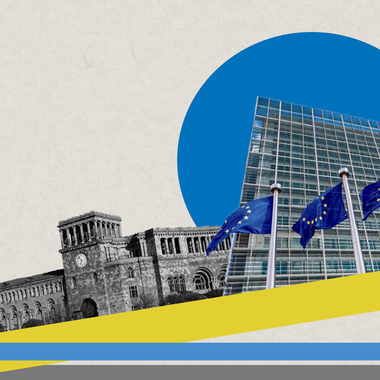
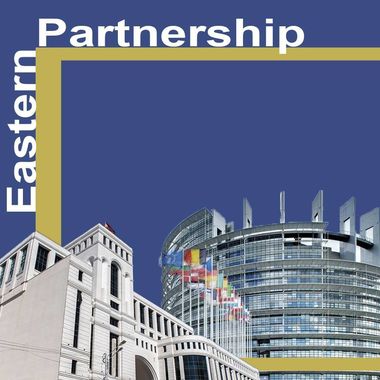


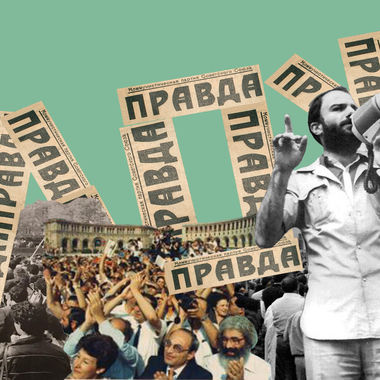
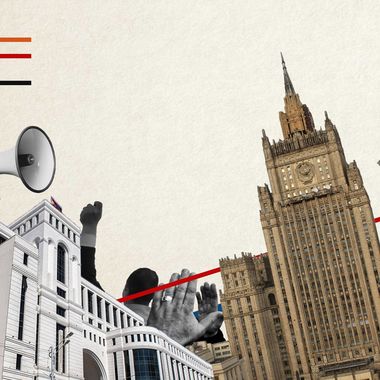
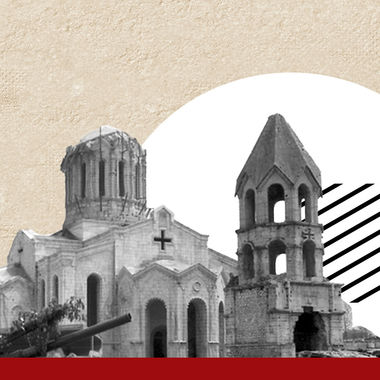


EVN Report welcomes comments that contribute to a healthy discussion and spur an informed debate. All comments will be moderated, thereby any post that includes hate speech, profanity or personal attacks will not be published.